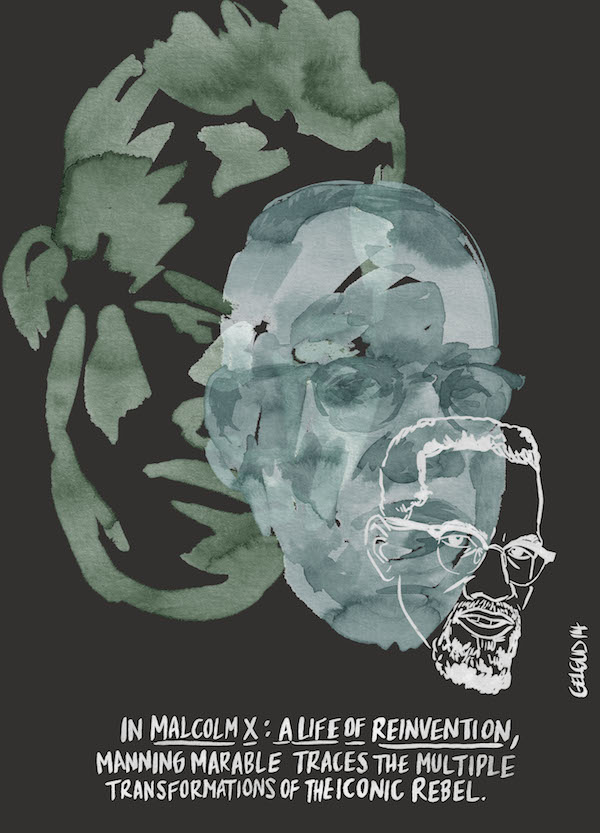A Look at the Reinvented Malcolm X, Assassinated This Week in 1965
By Nathan Gelgud

Nathan Gelgud illustration of Malcolm X inspired by Manning Marable's biography.
If you learned about Malcolm X from television in the 1990s, it was probably because you were watching Yo! MTV Raps and saw his likeness in a Public Enemy video, or because you saw Spike Lee, wearing an “X” cap, talking about the movie he was making. Malcolm X was iconic, heroic, a defiant and controversial figure embraced by the hip-hop community and emblazoned on posters and t-shirts.
But if you learned about Malcom X from television in 1959, it might have been from a documentary called The Hate That Hate Produced, beamed into leaving rooms in five half-hour installments. As Manning Marable writes in his Pulitzer-winning Malcolm X: A Life of Reinvention, a then-unknown Mike Wallace narrated this documentary series “for maximum shock value” as a “covert appeal to white liberals.”
Wallace may not have needed to stretch matters much in order to achieve shock value. He was reporting on the Nation of Islam, the radical religious organization in which Malcolm X made his name as an inspiring leader, speaker, and firebrand. Marable's sober account of the near-cultish group with a wild theology makes clear its major role in saving Malcolm's life and giving him direction, and also conspiring to murder him when he broke ties with it. That murder took place forty-nine years ago this week in 1965.
Marable's account of Malcolm's life is a detailed, intimate, and absorbing read. He makes great use of the extensive FBI files that were kept on Malcolm, a record that goes back to the time he spent in prison as a petty criminal. In 1950, he wrote a letter to President Truman saying that he was a communist and that during the last war, he'd attempted to join the Japanese army.
Whomever began the file on Malcolm X couldn't possibly have known how big that file would grow, that the convict writing the weird letter was converting to a fringe brand of Islam, would soon become the religion's chief spokesman, and would break from the group as he became more interested in American politics than the Draconian philosophy of his mentors. When Malcolm left the Nation and converted to a more worldly Islam, he was no less passionate and controversial a leader, but he was more interested in solutions for the condition of black Americans, and people of African descent worldwide.
The tragedy of Malcolm's death does not overwhelm the story, as Marable's telling of a life constantly in transition offers an inspiring and optimistic view of our ability, and perhaps necessity, to seek reinvention.
Nathan Gelgud is an illustrator who lives in Brooklyn. See more of his work at nathangelgud.com.

Nathan Gelgud illustration of Malcolm X inspired by Manning Marable's biography.
